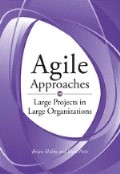BOOK REVIEW
 Book Title: Agile Approaches on Large Projects in Large Organizations
Book Title: Agile Approaches on Large Projects in Large Organizations
Author: Brian Hobbs and Yvan Petit
Publisher: Project Management Institute, Inc.
List Price: $14.97
Format: Soft cover, 133 pages
Publication Date: 2017
ISBN: 978-1-62825-175-3
Reviewer: Keith S Dever
Review Date: April 2019
Introduction
This book provides an interesting summary of an implementation problem set that is still evolving. While agile approaches are doing well in their “sweet spot”, that is not the case for their implementation for large projects in large organizations. The authors acknowledge at the beginning and end that they are likely leaving the reader with more questions than answers. But they certainly lay out critical areas of context for implementation that will help the reader understand what they would face with implementing agile approaches in a large organization.
Overview of Book’s Structure
The book is laid out in a straightforward manner beginning with a short executive summary and an introduction to the study as a whole. The study is designed to address agile approaches in terms of individual projects and the context in which they are carried out. It also looks to provide insight into progress in scaling agile practices beyond single teams and single projects.
A literary review sets the stage by providing baseline definitions for agile practices and their benefits, insight into using agile at scale and the evolution of scaling frameworks, and finally a look at agile’s relationship with organizational culture and team approaches. Next, the authors outline their methodology – a combination of case studies of six organizations and a survey.
The majority of the book follows with the results of the study. To begin, the characteristics of the organizations studied are outlined in terms of context – public or private sector, size, primary activity and use of the agile approach. Then comes a segment on the implementation of agile approaches in each organization. A short section discusses front-end planning and architecture. Next are results centering on the project organizations with an emphasis on team structure and roles. Finally, tools and techniques and applicable scaling frameworks are covered. The results conclude with a short portrait as provided by the results.
The authors complete their efforts with a short discussion segment covering team level, project level and the interaction between the project and the organization. Then they present their conclusion and remaining questions that deserve future research.
Highlights
The following are a few of my key takeaways from the book:
More…
To read entire Book Review, click here
About the Reviewer

Keith S. Dever
San Antonio, Texas, USA
![]()
Keith Dever is a transformational leader with a successful record of driving superior operations and demonstrated leadership ability in enabling rapid growth within organizations. His expertise lies in successfully creating and implementing strategic operational processes, coaching and developing employees, and managing technology programs and organization operations efforts to realize business operations improvements while overseeing a wide variety of operational responsibilities to ensure outstanding organizational oversight and optimize financial performance across a variety of industries. These include: client-facing program/project management and strategy transformation support, solution content development, business development and organization operations management, major business segment level financial management, budget development and oversight and policy and procedure reporting and control. And most recently, analytics and visualization, innovation and technology operations management for innovation services spaces, and propose/design/build/execute/operate cycles for technology centric spaces and events.
Keith can be contacted at Keith.dever1@gmail.com
Editor’s note: This book review was the result of a partnership between the publisher, PM World and the PMI Alamo Chapter. Authors and publishers offer the books to PM World; books are delivered to the PMI Alamo Chapter, where they are offered free to PMI members to review; book reviews are published in the PM World Journal and PM World Library. PMI Alamo Chapter members can keep the books as well as claim PDUs for PMP recertification when their reviews are published.
If you have read a good recently-published book related to managing programs, projects or teams of professionals, consider authoring a book review for publication in the PM World Journal. For our standard format or for more information, contact Editor@pmworldjournal.com or visit https://pmworldlibrary.net/book-review-program/
If you are an author or publisher of a project management-related book, and would like the book reviewed through this program, please contact Editor@pmworldjournal.com.









